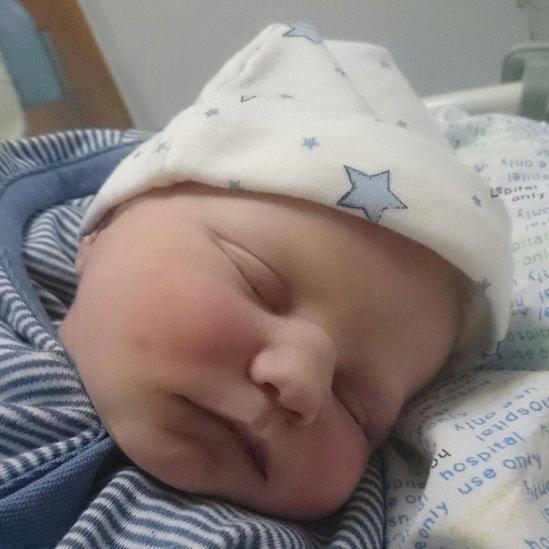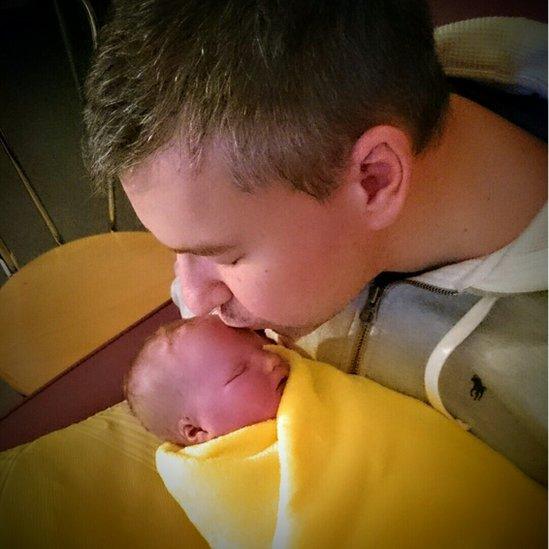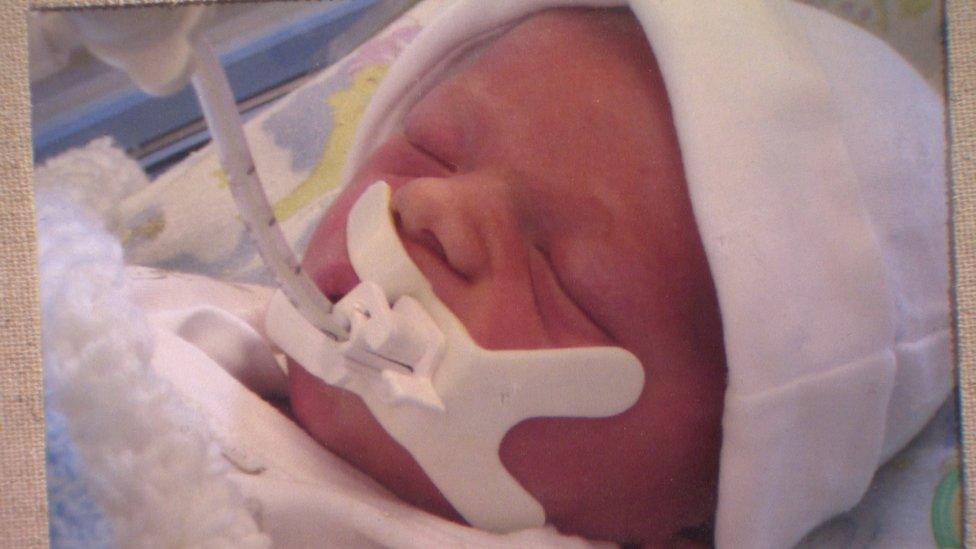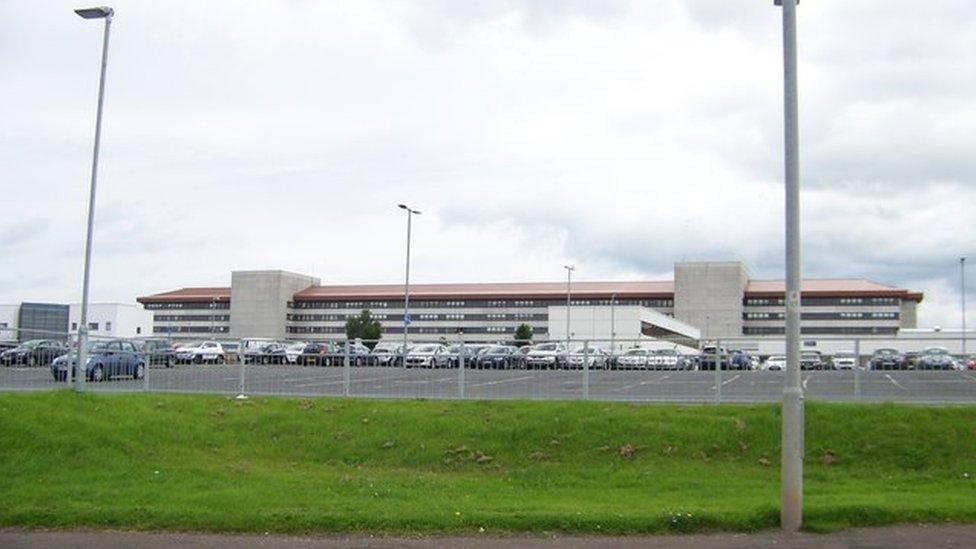Inquiry call over deaths in childbirth at Crosshouse Hospital
- Published
June and Fraser Morton believe hospital staff were overworked in the lead-up to their son Lucas being born
Parents whose babies died during childbirth at an Ayrshire hospital have called for a public inquiry into the circumstances surrounding their deaths.
At least six cases of so-called "avoidable deaths" have taken place at Crosshouse Hospital in Kilmarnock over the past eight years.
The bereaved families, including June and Fraser Morton from Kilmarnock, say they are still waiting for answers.
NHS Ayrshire and Arran has given them an "unreserved apology".
The Mortons' son Lucas died at the hospital last November.
The couple had moved to Kilmarnock to raise a family, but now say they have been so traumatised by events surrounding Lucas's death that they will have to leave the area.

Baby Lucas Morton died in November 2015 at Crosshouse Hospital
Fraser Morton said "We've got Lucas's room all prepared but we just can't go in it.
"We're going to have to move. It has taken such a toll. We've lost our future. So we can't give up."
NHS Ayrshire and Arran has offered its "sincerest condolences" to the family.
It has apologised to Mrs Morton for "the management offered to you in the later weeks of your pregnancy which almost certainly failed to identify complications that contributed to Lucas's very tragic and unnecessary death".
"Unnecessary or "avoidable" deaths are referred to as those where harm was caused to a healthy baby during childbirth - usually resulting in them being deprived of oxygen.
But although the health board referred to it as a "severe" adverse event, it did not carry out a full serious adverse event review - which is common practice - and would have meant that redacted details would have been published on its website.
'Substandard care'
External reviews and reports by the health board indicate a failure to diagnose pre-eclampsia, delays and a failure to correctly monitor the baby's heartbeat - and a failure to alert senior members of staff despite being unable to hear the baby's heartbeat for 35 minutes.
They refer to "substandard" and "suboptimal" care and say different steps could have resulted in a different outcome.
"Everything that could have gone wrong, went wrong," said Mr Morton. "I believe they were understaffed and overworked. They didn't have the training knowledge and experience, and I believe that comes back to management issues.
"If mistakes had not been made, the difference is quite simple. Lucas would have been here. It would have been his first birthday. The independent reports substantiate that and say earlier intervention would have led to a different result."
Correspondence also referred to failure to enforce mandatory training on foetal heartbeat monitoring [CTG] because of staff shortages.
A letter from the health board in June states: "Unfortunately midwifery staff do not have time within their working practices... to attend CTG meetings. With the challenges of shift working and constraints of the European working time directive as well as a significant problem with unfilled posts... group teaching is harder to provide. The re-introduction of multi-disciplinary CTG training is very important and at present we cannot make this mandatory due to our midwifery staffing levels."

Fraser Morton with his son Lucas
The health board report the death to the Crown Office - despite Crown Office guidelines which state: "The doctor with the most detailed knowledge of the circumstances of the death should report it.
"Any death the circumstances of which are the subject of concern to, or complaint by, the nearest relatives of the deceased about the medical treatment given… the circumstances of which might indicate fault or neglect on the part of medical staff or where medical staff have concerns regarding the circumstances of death… likely to be subject to an Adverse Event Review"
A report by external consultant Dr Dina McLellan later commissioned by the Crown Office found delays that were "not appropriate", including a failure to get a foetal heart rate for more than 30 minutes.
'Not unique'
The families' call for a public inquiry follows an investigation into the "lethal mix" of failures at a Cumbrian hospital which led to the unnecessary deaths of 11 babies and one mother
The inquiry, external into the University Hospitals of Morecambe Bay NHS Trust found 20 major failures from 2004 to 2013 at Furness General Hospital.
NHS Ayrshire and Arran told BBC Scotland it ensures all the appropriate staff do have training on foetal monitoring and that they are aware of and follow the guidelines on reporting to the procurator fiscal.
Lucas died at Kilmarnock's Crosshouse Hospital exactly 12 months ago. But the BBC has learned that his death and the circumstances surrounding it are not unique.
Denise and Steven Campbell have a daughter called Alex and a son called Maxwell, but they believe they should and could have three children. Their son Joseph died during childbirth at Crosshouse Hospital four years ago.
"Our side of the story never, ever got asked," said Denise. "They said they just sat round the table with a cup of tea and talked about it and decided there was nothing that could have been done - that it was just one of these things.
"Then we spoke to the consultant who said things should have been done differently - especially in relation to monitoring Joseph's heartbeat."
The Mortons and the Campbells now want a public inquiry into the deaths of their sons.

Joseph Campbell died at Crosshouse Hospital four years ago
'Systemic failings'
Whistleblower Rab Wilson went public in 2012, saying there were a number of "avoidable deaths" in Ayrshire and Arran that required investigation.
"I was given a strong assurance by John Burns, the chief executive, that lessons would be learned and that these things would not happen again," he told the BBC.
"Yet here we are three, four years down the line and exactly the same thing has continued to happen in Ayrshire and Arran. And who is accountable for this? It really comes back to systemic failings. But the chief executive is in charge of these systems and should be putting them right.
"Families in desperate need of help and support, in desperate circumstances, are being led round and round in circles going to different regulatory bodies but no one is taking responsibility."
In 2012, the then health secretary ordered an investigation into NHS Ayrshire and Arran after the health board was severely criticised for withholding more than 50 reports on serious adverse incidents at its hospitals and clinics.
Documents show that prior to 2012 there were a further four deaths of babies.
Several of those reports refer to the deaths of babies with reference to failings in monitoring of their heartbeat [CTG]. One such report published in 2012 concludes: "There appears to be a failure of care in several areas; failure of an on-call consultant to attend, failure in communication of information, lack of interpretation of the CTG trace and vital signs."

Six cases of so-called "avoidable deaths" have taken place at Crosshouse Hospital over the past eight years
In 2012, Ayrshire and Arran had the highest rate of deaths for newborn babies in mainland Britain, - according to the Audit MBRRACE-UK.
Its figures have since improved. But in their latest reports this year, NHS Grampian, NHS Ayrshire and Arran and NHS Borders had death rates up to 10% higher than average.
MBRRACE looks at babies' deaths before, during, or shortly after birth. Their reports highlight those trusts and health boards which need to review their care provision with some urgency.
Dr Alison Graham, executive medical director of the NHS Ayrshire and Arran health board said: "I would take this opportunity again to apologise to both families for any failings they experienced during their time with us.
"NHS Ayrshire and Arran is committed to ensuring that, if there is any possibility that there has been avoidable harm, this is investigated thoroughly and that we are open, honest and transparent about this."
Training requirement
Dr Graham added: "When reviews identify that there has been avoidable harm we speak with people affected and report this openly through our clinical governance systems. We also share any findings with the families concerned. This ensures we have the proper procedures in place to learn and improve.
"NHS Ayrshire and Arran and our medical staff fully understand the requirements for reporting stillbirth deaths to the procurator fiscal and we fulfil this requirement.
"We have an annual mandatory training requirement for midwives for Cardiotocography (CTG). I can confirm that all midwives within Ayrshire Maternity Unit who are required to interpret CTG results have completed this training and do so on an annual basis.
"Since 2008 up until 31 March 2016, there have been four Significant Adverse Event Reviews (SAERs) concerning stillbirth deaths at Ayrshire Maternity Unit. During this time, 33,716 babies have been born at Ayrshire Maternity Unit."
In relation to the case of Lucas Morton, a spokesman for the Crown Office said: "The investigation, under the direction of the Scottish Fatalities Investigation Unit (SFIU), is ongoing and the family will continue to be kept updated."
On Tuesday, Lucy Adams will examine adverse events in maternity hospitals across the country.